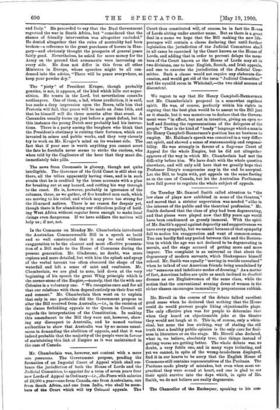In the Commons on Monday Mr. Chamberlain introduced the Australian
Commonwealth Bill in a speech so lucid and so well constructed that it may be said without exaggeration to be the clearest and most effective presenta- tion of a Bill made to the House of Commons during the present generation. Mr. Gladstone, no doubt, was more copious and more detailed, but with him the splash and spray of the verbal torrent too often obscured the shape of the waterfall and left a sense of mist and confusion. Mr. Chamberlain, we are glad to note, laid down at the very beginning of his speech the great Whig principle which is the corner-stone of the Empire,—namely, that the tie with our Colonies is a voluntary one. "We recognise once and for all that our relations with them depend entirely on their free will and consent." Mr. Chamberlain then went on to explain that only in one particular did the Government propose to alter the Bill received from Australia,—i.e., in the excision of the clause forbidding appeals to the Queen in Council as regards the interpretation of the Constitution. In making this amendment to the Bill they were not, however, show- ing any disrespect to Australia, and he named various authorities to show that Australia was by no means unani- mous in demanding the abolition of appeals, and that it was indeed probable that the majority of the people were in favour of maintaining this link of Empire as it was maintained in the case of Canada.






































 Previous page
Previous page